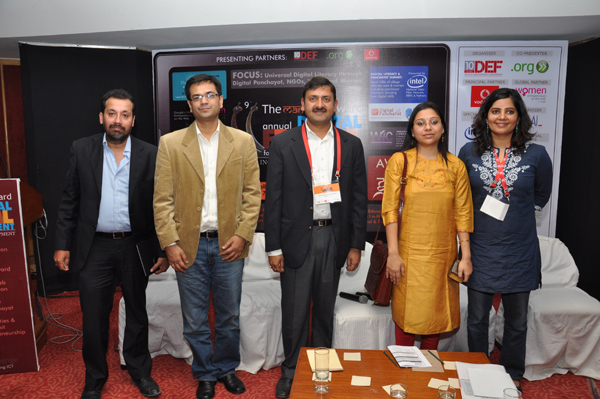Panel Discussion by Yourstory.in
The following session held was Technology & Entrepreneurship: Success Strategies for start-ups. It was aimed at discussing best entrepreneurial start-up successes and deliberating on the entire ecosystem of start-ups could be perceived in the light of Social Impact and how better strategies could help in sustainability, the role of social and green investors, mentorship challenges related to management, scale and revenue output. The session was chaired by Mr. Arvind Rao, Advisor – Digital Services Innovation (Reliance Infotel) and moderated by Ms. Shradha Sharma, Founder & CEO – Yourstory.in.

The session started with the introduction of the panelists. The panel included
- Mr. Ambarish Gupta, Founder – Knowlarity
- Mr. Siddhartha Chandurkar, Founder – Shephertz Technologies
- Mr. Shailesh Vickram Singh, Managing Partner – Seedfund
- Ms. Eittee Gupta, Deputy Director – Center for Innovation & Technology Commercialization (FICCI).
Ms. Sharma (Moderator) opened the discussion with a question directed to Mr. Siddhartha Chandurkar and Mr. Ambarish Gupta on how tech startups can survive those 2 initial years without funding and what shall be the strategies to scale up. This question was very relevant in the context of Indian startups that from the beginning start scrounging for funds.
Mr. Siddhartha shared that the story of how his company began in the year 2010 with a motive to build a product in the cloud space. He highlighted that the first aim of a startup should be to develop products, get customer and get validation for the product rather than to get funded. Most startups operate with the sole motive of getting funding, which is not the case. Getting funded is a new journey altogether because from that point you start taking your business to new level.
Mr. Ambarish held similar views like that of Mr. Siddhartha and shared how he and his Co-founder kept working on the product part time while still with their companies. He also shared the story on how his company landed up with a contract for Orissa elections, which gave him almost a crore of rupees in bank. He said that while it was partly because of chance, it was still possible because they knew that they can pull the whole thing off. Thus companies, who keep doing services to survive, must still know that they need to build product at some stage or the other. In short a discipline knowing what you do is important.
Mr. Shailesh shared his views on how he could not raise money from investors as an entrepreneur. He added that with his experience both as an entrepreneur and an investor, he has come to realize that funding is not a guarantee of funding. 99% people in the startup sector today believe that funding is a guarantee of success which is a myth. He said that venture capitalists are only there to support entrepreneurs. It is always about how good a fighter you are, how quickly you can adapt your product as per the consumer needs and get a validation for your product and your company. Thus at the end of the day what matters is how good you can manage your resources and get the best out of it.
Ms. Shradha requested Mr. Shailesh to share as to what are the criteria that lead to an investment by the investor in a tech startup. He replied by sharing that as everyone knows already, it’s all about team. At least the core team should comprise of coders. If you do outsourcing of technology part your tech startup then you are simply not there. Secondly a great team is one which can move quickly that is can adapt quickly. It means that even if you fail, you must quickly erase every trace of failure and move forward. Lastly the space to which they cater must be large enough to create a significant value.
Our next panelist, Ms. Eittee Gupta, shed light on how FICCI has been helping the startups to reach market. She said that they started their “technology promotion and commercialization” Centre back in 2007. She explained as to how Lockheed Martin approached them in 2007 to promote Indian startups as part of their CSR initiative. Thus FICCI with Lockheed Martin Corporation and the IC2 Institute at the University of Texas at Austin launched the India Innovation Growth Program in March 2007. In the first year itself they received 107 applications. They screen application through a patented process and get a technology validation of the product. She added that then they get market validation by talking to customers, potential VCs, potential investors and the end consumers. Thus they do kind of market research of the selected technologies after they have filtered them out. Around 30 odd startups are selected every year. Then a market analysis report is compiled for each of these startups. These startups are then given one week advanced training on various factors such VC financing, technology commercialization etc. after which participants need to pitch in front of jury for investment. Final winners are given investments as well as business development managers to help them reach the market.
The discussion was followed with a round of question & answer with the audience.
